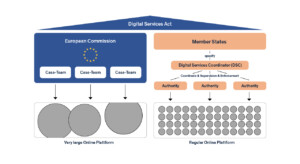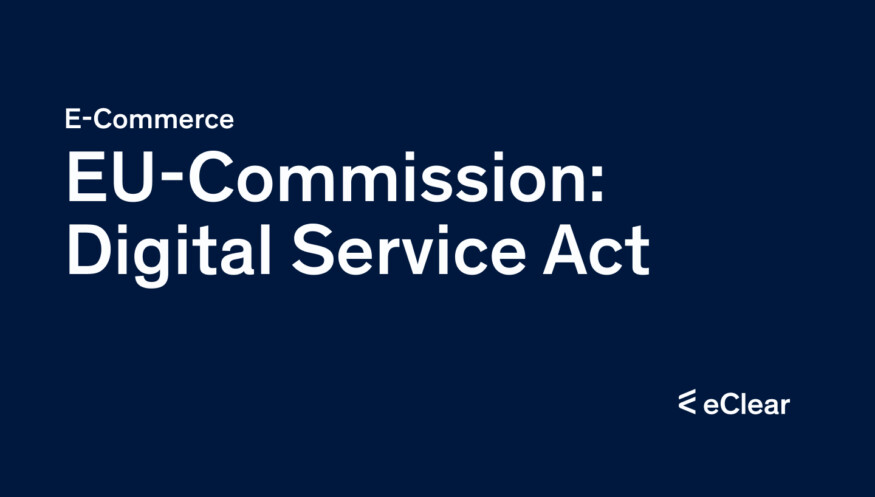Undeniably, the internet has become a vital constant and mainstay of societies worldwide. Brave new worlds are opening up: Before going on holiday, do you have to go to a travel agency and endure annoyingly long consultations? Passé! Nowadays, people book online, of course. Whether it is a flight, hotel, restaurant, or Uber, everything can be done quickly and easily from your mobile phone.
But where there is light, there is shadow. Or, to put it more gallantly, With its numerous advantages, the much-vaunted digitalised world also brings challenges regarding data protection, responsibility, and jurisdiction. And to meet these new realities, the European Union (EU) has introduced the Digital Services Act (DSA). The DSA is a landmark law that redefines the rules for accountability of online platforms and the protection of users’ rights in the digital world.

Copyright: BVDW
Background to the Digital Services Act
The origins of the DSA date back to the year 2000, when the EU adopted the E-Commerce Directive, which formed the basis for the liability limitations of online platforms. However, over the years, it became apparent that this directive must meet the current requirements. Still, it needed to be updated in several respects above all the developments in the digital world. The DSA was created to close this gap. In a recent announcement, online platforms had to disclose their user numbers by 17 February 2023. The European Commission has determined that platforms or search engines with more than 45 million users, corresponding to 10% of the European population, are classified as “very large online platforms” or “very large online search engines”.
This category of services is more strictly regulated and has four months to comply with the demands of the data protection authority. This includes conducting and submitting the first annual risk assessment to the European Commission.
EU member states are required to appoint digital service coordinators by 17 February 2024. This regulation also affects online platforms with less than 45 million active users, which must comply with all digital services regulations.
Accordingly, the DSA aims to strengthen consumer protection, thus primarily user protection, in the digital space by updating and clarifying the framework for the regulation of online platforms, such as social media, e-commerce websites, and other digital service providers. By introducing transparency and liability rules, the DSA aims to ensure that user rights are protected and that the responsibility of online platforms is guaranteed.
The DSA – where does it apply?

The importance of the DSA for society can be summarised in three primary areas:
- Protection of users’ rights: the DSA provides better protection by setting clear rules for removing illegal content, combating disinformation, and upholding freedom of expression. This promotes a safer and more responsible online environment.
- Transparency and accountability: The DSA obliges online platforms to be more transparent about their moderation practices and algorithms. This allows users and regulators to better understand these platforms’ decisions and practices and take legal action if necessary.
- Strengthening the Single Market: The DSA contributes to creating a harmonised Digital Single Market by providing a single legal framework for all EU Member States. This promotes competition, innovation, and growth in the digital sector and ultimately benefits consumers.
This sounds good, in theory. The Digital Services Act is essential to a fairer, safer, and more transparent digital world. It recognises our societies’ challenges in the increasingly connected world and sets clear rules for accountability, user protection, and rights. In practice, however, it means regulating without censoring. The discretionary powers of Facebook and Co. will undoubtedly lead to discussions in the future, primarily when the much-cited freedom of opinion is used as an argument.
The DSA – only together will it work
Implementing the Digital Services Act is an ongoing process that requires close cooperation between EU Member States, regulators, online platforms, and users. All stakeholders must work together to successfully implement the DSA’s objectives and take advantage of the digital world’s opportunities.
In the coming years, we will see more national and international legislative initiatives impacting the digital space. However, the Digital Services Act is a solid starting point that sets the framework for better user protection and greater accountability of online platforms.
Liability rules for illegal content in the Digital Services Act
In addition, the Digital Services Act (DSA) brings new liability rules for access, caching and hosting services. What do these look like?
- Access services allow access to specific resources, e.g., VPN (Virtual Private Network) or Remote Desktop. Example: a company uses a VPN to give its employees secure remote access to the internal network when working from home or on the road.
- Caching services: Services that use caching to deliver data faster. Content Delivery Networks (CDNs) are an example of this. Example: an online shop uses a CDN to reduce the load time of its website by distributing copies of the website on servers around the world to place it closer to users.
- Hosting services enable content to be made available online, e.g., web hosting for websites or cloud hosting for applications. Example: A developer uses cloud hosting to run an application in a virtual environment without providing servers and infrastructure himself. The application is hosted in the cloud and can be accessed by users via the Internet.
In principle, service providers should not be liable for transmitting illegal content. However, some important exceptions and conditions apply in various cases.
Access providers who provide internet access services must not have initiated the content transmission themselves or have selected the addressee of the content to be exempt from liability. Caching and hosting services are subject to additional obligations, such as blocking or removing illegal content. Hosting providers are exempt from liability if they do not know unlawful content. However, as soon as they become aware, they must block or remove the content quickly. It is important to note that the DSA does not impose a monitoring obligation on service providers.
A notable innovation is the “Good Samaritan clause”. This provision allows service providers like Facebook or Instagram to conduct voluntary investigations without losing liability relief. This means they can proactively search for illegal content without fearing losing their liability privileges.
The new liability rules in the DSA are intended to help clarify the responsibility of online platforms for illegal content and create incentives for actively combating such content. This will provide more legal certainty for providers and users and help make the internet safer and more responsible for all.
What is the DMA (Digital Market Act)?
The DMA (Digital Markets Act) is another European Union bill that regulates online platforms. It is specifically targeted at large platforms with significant market power and aims to promote competition and innovation in the digital economy.
Although the DMA and the DSA have different objectives, the two bills are closely related. In fact, the EU Commission proposed the two drafts jointly to ensure coherent and comprehensive regulation of the digital economy.
The DMA and the DSA are complementary. The DMA focuses on competition and market power of online platforms, while the DSA focuses on platforms’ responsibilities towards their users. However, both bills aim to improve the protection of consumers and small businesses in the digital space and create a fairer and more open online ecosystem.
Conclusion
The Digital Services Act marks an almost overdue turning point in regulating the digital world. It continues to ensure that the internet remains a place where innovation, freedom of expression and data protection are paramount. But it also confirms, as in the analogue world, that we do not continue to accept without sanction the lurking dangers that emanate from some while they abuse the digital world as a lawless space – at least in some areas – to continue to incite hate and hatred.
Therefore, we must adapt to new realities and see digital space as an opportunity to improve our quality of life and grow together.
The launch of the DSA shows that the EU is ready to tackle the challenges of the digital era and create a fair and responsible online environment.







